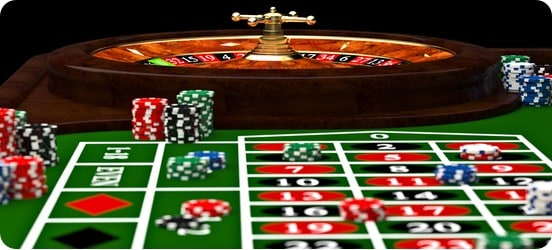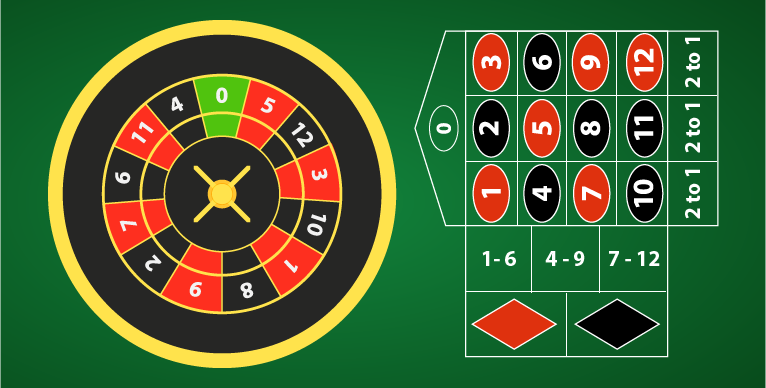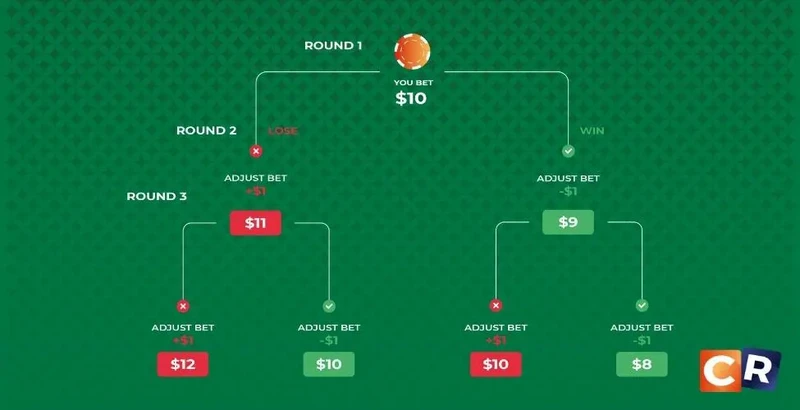Roulette is a popular casino game that has been around since the 18th century. It is a game of chance that involves a spinning wheel with numbered slots and a ball that is dropped onto the spinning wheel. Players bet on where the ball will land, and the payouts are based on the odds of the bet.
The game of roulette has two main variations, American and European. The American version of the game has 38 slots, with numbers ranging from 1 to 36, plus a 0 and a 00. The European version of the game has 37 slots, with numbers ranging from 1 to 36, plus a single 0. The presence of the extra 00 in the American version of the game gives it a slightly higher house edge than the European version.
To play this game players place their bets on the table layout, which corresponds to the numbered slots on the wheel. Once all bets have been placed, the dealer spins the wheel and drops the ball into it. When the ball comes to rest in one of the numbered slots, the dealer announces the winning number and pays out the corresponding bets.
Roulette is a game of pure chance, and there is no way to predict where the ball will land. Players can use various roulette strategies to try to increase their chances of winning, such as the Martingale system, the Fibonacci system, or the D’Alembert system. Ultimately, the outcome of the game is determined by luck, making it an exciting and unpredictable game to play.

The History of Roulette
Roulette’s history is fascinating, and it’s believed to have originated in France back in 1657, when Blaise Pascal, a well-known mathematician, was experimenting with creating an infinite motion machine. During his experiments, Pascal accidentally invented the first roulette wheel, which he called the “little wheel,” marking the beginning of the game’s story. While Pascal’s invention explains how the roulette wheel was created, the actual origin of the game is still unknown.
Several stories surround the development of the game, but none of them can be substantiated. One popular theory is that a French monk created the game, while another suggests that it was a Dominican monk who based the game on an ancient Tibetan game. The game’s rules suggest it may have originated in England, as it bears similarities to old games such as Roly Poly and Ace of Hearts.
However, what is clear is that the game we know today as roulette was first played in France in the late 19th century. The initial version of the game featured a wheel with a single and a double zero spot, which were colored red and black, but later changed to green to prevent confusion. For many years, the double zero version was more popular until the Blanc brothers, Francois and Louis, introduced the single zero wheel, which remains the standard in most casinos today.
Roulette has come a long way since its early days and has become a popular casino game worldwide. It has also inspired various betting systems and strategies, making it a timeless classic in the world of gambling.
How to Play Roulette?
Roulette is a game of chance that is played on a spinning wheel with numbered pockets. The objective of the game is to correctly guess where the ball will land on the wheel. Here are the basic steps to play:
- Place your bets: Before the wheel is spun, players place their bets on the table, which is marked with different numbers and betting options. You can place your chips on a single number, a group of numbers, or on the outside bets, which include even/odd, red/black, high/low, and other similar options.
- Spin the wheel: Once all bets are placed, the dealer spins the roulette wheel and drops a small ball onto the spinning wheel.
- Wait for the outcome: As the ball spins around the wheel, it will eventually come to a stop in one of the numbered pockets. If the ball lands on a number or betting option that you’ve placed a bet on, you win!
- Collect your winnings: The dealer will pay out the winning bets, and the losing bets will be collected.
It’s important to note that roulette has different variations, and the rules may differ slightly between them. For example, there’s European roulette, which has a single “0” pocket, and American roulette, which has both “0” and “00” pockets, giving the house a slightly higher edge. So, it’s always a good idea to check the rules of the specific game you’re playing before placing your bets. Additionally, some casinos may also have their own specific rules for roulette, so it’s worth familiarizing yourself with these as well.
Roulette Variants
Here are the most popular variants of Roulette:
American Roulette
American Roulette is one of the most popular variations of the game, commonly found in American casinos. It is played with a wheel containing 38 numbered pockets, including a single “0” pocket and a double “00” pocket. The additional “00” pocket gives the house a slightly higher edge, making it more difficult for players to win.

European Roulette
European Roulette is another popular variant, which features a wheel with 37 numbered pockets, including a single “0” pocket. This version has a lower house edge compared to American Roulette, making it more favorable for players. It’s also worth noting that the numbers on the wheel are arranged differently from American Roulette.
French Roulette
French Roulette is similar to European Roulette in terms of the wheel layout, with 37 numbered pockets including a single “0” pocket. However, the table layout is slightly different, and there are some unique rules that set it apart from other variations. For example, the “en prison” rule allows players to recover their losses if the ball lands on the “0” pocket.
Mini Roulette
Mini Roulette is a scaled-down version of the game, featuring a smaller wheel with only 13 numbered pockets, including a single “0” pocket. This variant is often played online, and it can be a good option for players who prefer a faster-paced game with smaller bets.

Multi-Wheel Roulette
Multi-Wheel Roulette is a newer variant that allows players to bet on multiple wheels at the same time. Typically, this version features 8 or more wheels, each with its own set of bets. This can be an exciting option for experienced players who want to increase their chances of winning.
Live Dealer Roulette
Live Dealer Roulette is an online version of the game that allows players to experience the excitement of playing at a real casino from the comfort of their own home. The game is streamed in real-time, and players can interact with the dealer and other players. This version is available in different variations, including American, European, and French Roulette.
Roulette Strategies
Roulette is a game of chance, and as such, there is no surefire way to win every time. Some players use various strategies to increase their chances of winning or to manage their bankroll effectively. It’s important to note that no strategy can guarantee a win, and players should always gamble responsibly. Here are some of the most popular strategies:
Martingale Strategy
The Martingale Strategy is one of the most popular betting systems in Roulette. This strategy involves doubling your bet after each loss, with the aim of recovering all previous losses and making a profit. For example, if you bet $5 on black and lose, you would bet $10 on the next spin. If you lose again, you would bet $20, and so on. The idea is that eventually, you will win a bet and recoup all previous losses.
Reverse Martingale Strategy
The Reverse Martingale Strategy, also known as the Paroli system, is the opposite of the Martingale. This strategy involves increasing your bet after each win and decreasing it after each loss. For example, if you bet $5 on black and win, you would bet $10 on the next spin. If you win again, you would bet $20, and so on. The idea is to ride your winning streaks while minimizing losses during losing streaks.
D’Alembert Strategy
The D’Alembert Strategy is a popular betting system that involves increasing your bet by one unit after each loss and decreasing it by one unit after each win. For example, if you bet $5 on black and lose, you would bet $6 on the next spin. If you win, you would bet $5 again. The idea is that you can recoup your losses by winning a few consecutive bets.

Fibonacci Strategy
The Fibonacci Strategy is based on the famous Fibonacci sequence, where each number is the sum of the two preceding numbers (1, 1, 2, 3, 5, 8, 13, etc.). In Roulette, this strategy involves betting the sum of the previous two bets after each loss. For example, if you bet $5 and lose, you would bet $8 on the next spin ($3 + $5). If you lose again, you would bet $13 ($5 + $8), and so on. The idea is to recover losses quickly and minimize risk during losing streaks.
James Bond Strategy
The James Bond Strategy is a popular betting system that involves placing specific bets on the Roulette table. This strategy involves placing $140 on numbers 19-36, $50 on numbers 13-18, and $10 on the “0” pocket. This covers 25 out of the 37 possible outcomes on the wheel, giving the player a good chance of winning. However, this strategy requires a relatively large bankroll to be effective.
Additional Roulette Tips
Here are some tips for playing:
- Understand the odds: Before playing Roulette, it’s essential to understand the odds of the game. Each bet has a different probability of winning and a different payout, so it’s important to understand the risk-reward ratio of each bet.
- Set a budget: It’s crucial to set a budget before playing Roulette and stick to it. Don’t chase losses or bet more than you can afford to lose.
- Play European Roulette: If possible, play European Roulette instead of American Roulette. European Roulette has a single zero pocket, which gives players better odds than American Roulette, which has both a single and double zero pocket.
- Don’t rely on betting systems: Betting systems like the Martingale or D’Alembert strategy can be fun to use, but they do not guarantee a win. Remember that Roulette is a game of chance, and each spin is independent of the previous one.
- Use bonuses and promotions: Many online casinos offer bonuses and promotions for playing Roulette. Take advantage of these offers to increase your bankroll and potentially win more.
- Know when to stop: It’s important to know when to walk away from the Roulette table. If you’re on a losing streak, it’s best to take a break and come back another day. Don’t keep playing with the hope of recouping your losses.
- Have fun: Finally, remember that Roulette is a game, and it’s meant to be fun. Don’t take it too seriously, and enjoy the experience of playing.
FAQ
Conclusion
Roulette is a classic and popular casino game where players place bets on where a ball will land on a spinning wheel. The game offers various betting options and payout rates. While there is no guaranteed strategy to win, some players use betting systems to increase their chances. Advancements in technology, like virtual and augmented reality, and live dealer games, make Roulette more immersive.
